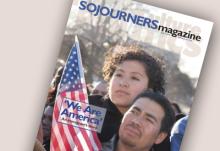Education

What do the words and witness of Jesus demand of a college that calls itself Christian?

A Catholic university strives to make hunger for justice part of the curriculum.
Gay rights activists seek - and find - dialogue on (some) Christian campuses.
Complete with play money, appliance cards, and transportation passes, the Community Action Poverty Simulation is much like a role play or board game.
World Peace. A new Internet service provider, Peacenik.co.uk, will raise money for peacemakers working in conflict zones around the world.
Every movement needs its revolutionaries and spokespersons, and in the growing crusade for a healthy, ethical, and “fair” food system, Bryant Terry and Anna Lappé happen to be both. Terry is a chef and founder of b-healthy! (Build Healthy Eating and Lifestyles to Help Youth)—a nonprofit group in New York that teaches low-income kids not only about nutrition, but also how to prepare healthy food themselves. Lappé is a writer, speaker, and co-founder (with her mother, Frances Moore Lappé) of the Small Planet Institute and Small Planet Fund. The latter supports grassroots efforts around the world that address the causes of hunger and poverty.
The two packed their passion and experience into Grub: Ideas for an Urban Organic Kitchen, a practical book that explains why our food system is the way it is, but also what we can do to change it. And don’t be surprised if, along the way, you pick up a few tips about cooking (pepper grinders are key) and music (Césaria Évora is nice accompaniment to cinnamon-dusted sweet potato fries). Associate editor Molly Marsh spoke recently with the author-activists.
Sojourners: So why the name Grub? What is grub?
Bryant Terry: When Anna and I started working on this project, we had so many people tell us that healthy organic food is for wealthy baby boomers. That’s a common misconception. We wanted people to understand that grub—healthy, local, sustainable food—is food that’s accessible to everyone. It’s something all people have a right to.
Day Burtness and Dan Borek hoped to start an organic farm and community-supported agriculture program at St. Olaf College. But Northfield, Minnesota—a small, two-college town 35 miles south of Minneapolis-St. Paul—was already served by multiple CSAs and a food co-op. School officials were supportive but skeptical that a student-run farm would find any real market, even if the two students could come up with the necessary land and capital.
But Burtness and Borek obtained the use of a small piece of campus land and later received funding from the student government association. They also met with Hays Atkins, who runs St. Olaf’s food service for the Bon Appétit company, to discuss the possibility of a student farm that would function as a wholesaler instead of a CSA. In a move that would ensure both the college’s green light and, ultimately, the farm’s success, Atkins promised to purchase every piece of produce the farm could grow.
While Atkins’ commitment to a student-initiated project is surprising and impressive, it fits squarely with the considerable energy St. Olaf, a college of the Evangelical Lutheran Church in America, has for several years invested in ecological sustainability. The school’s current strategic plan names sustainability as a goal, and a task force—comprised of students, faculty, and staff—supports several projects aimed at both reducing the college’s collective ecological footprint and facilitating education and conversation on the subject. As anyone who has scrutinized environmental impact knows, a primary concern is food—its production, use, and waste disposal.
Love binds and builds, heals and hallows, redeems and restores. A broken world can expect all this and more, say our Johannine scriptures, when God’s power courses mystically through human events. John 10 finds the shepherd Jesus foretelling self-sacrificial love for the sheep. In John 15, Jesus calls the faithful to be willing to lay down their lives for their friends.
1 John 4 focuses on the intimate nature of God’s love for us, which evokes our love for others, while the next chapter equates the love of God with keeping the divine commandments. On the stage of Acts 1, 4, 8, and 10, the fruit-bearing and inclusive nature of divinely inspired love is dramatized by the great cast that is the early church.
This month’s passages offer both a head-on command to love and a traveler’s guide to the nature of love itself. John makes up only 10 percent of the New Testament, yet it provides a full third of the references to love. “Love” appears in John more often as a verb than a noun. Feelings won’t suffice. Actions must prevail.
The Holy One leads us beside still waters and restores our souls, whether we are Gentiles, eunuchs, or the homeless of Detroit. This power of life originates from God in every moment, forming living, healthy relationships.
God chose to enter history and love us. We must choose to love others and head into a world that doesn’t like those who love unconditionally.

To borrow a term from social movement theory, universities can be "movement halfway houses" that educate leaders for social justice. Higher education institutions have trained and nurtured numerous social movements and activists that have changed our world. The Student Nonviolent Coordinating Committee, which played a key role in the civil rights movement, came from a coalition of college students. Northern college students infused Freedom Summer's voter registration drives. More recently, student networks have rapidly expanded protests of corporate globalization and the U.S. Army's School of the Americas. Anti-sweatshop and living wage movements also are building momentum because of students.
These movements emerge, in part, because university faculty and staff are part of the conscientizing process of young people. Universities emphasize systemic analysis of social problems. They prize critical thinking skills. They encourage creative use of language and symbols. Combine these skills with higher education's focus on developing leaders, and we can see the potential of the universities to produce multiple generations of justice seekers.
We find the summons in our institutions' mission statements, the statements that no student, faculty, or staff ever really reads. But it's there, the call to moral learning and social justice. At some schools, the commitment is explicit: "Loyola Marymount understands and declares its purpose to be: the encouragement of learning, the education of the whole person, the service of faith, and the promotion of justice." At others, the call is embedded in an understanding of the proper use of knowledge: "Emory's mission lies in two essential, interwoven purposes: through teaching, to help men and women fully develop their intellectual, aesthetic, and moral capacities; and, through the quest for new knowledge and public service, to improve human well-being."
Universities experience enormous pressure to deliver a marketable product. But higher education is called to be more than a conduit for career-making. Our students are more than clients. Classically, education was meant for the whole person—for "full human flourishing." As University of Chicago professor Martha Nussbaum notes, U.S. higher education has been devoted particularly to the "cultivation of the whole human being for the functions of citizenship and life generally." At the core, universities are more than service providers with privileged clients. We are moral actors shaping the character and justice of society.
BUT EDUCATING change agents for social justice is not the same as encouraging increased volunteerism on campus, which is embraced much more easily by institutions and a broad political spectrum.
